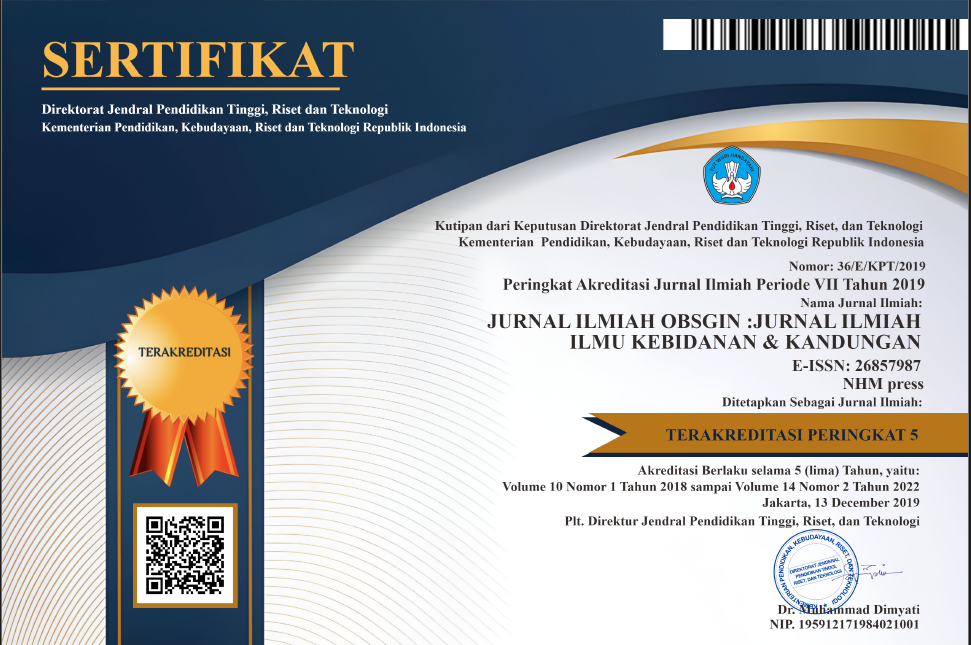THE FACTORS THAT INFLUENCE THE READINESS OF POSTPARTUM MOTHERS TO INITIATE POSTPARTUM SEXUAL ACTIVITY IN PMB ALFU FITRIYAH SURABAYA CITY
Abstract
Sexuality is an interaction and relationship with individuals of different sex, including thoughts, experiences, lessons, ideals, values, fantasies and emotions. In the puerperal mother, sexual activity can be started after the lochea stops passing. Based on a preliminary study of 10 postpartum mothers, there were 8 postpartum mothers who were not ready, namely 3 because of perineal pain, 2 people to get pregnant again, 3 people felt their sexual desire decreased due to fatigue. The purpose of this study is to analyze the factors that influence the readiness of postpartum mothers to initiate postpartum sexual activity at PMB Alfu Fitriyah Surabaya.
The research design used was an analytic survey with approach cross- sectional. The independent variables in this study were husband's support, parity, age, and education, while the dependent variable was the readiness of the postpartum mother to initiate postpartum sexual activity. The population in this study was 49 postpartum mothers, with a sample size of 32 postpartum mothers in March-May 2019 at PMB Alfu Firiyah Surabaya City with method Purposive sampling, data collection using a questionnaire using the statistical Spearman's rho test.
The results showed that there was a significant influence between husband's support and readiness (p = 0.001, r = 0.545). There was a significant effect between parity and readiness (p = 0.001, r = 0.546). There was a significant effect between age and readiness (p = 0.002, r = 0.525). There was a significant effect between education and readiness (p = 0.007, r = 0.415).
It is hoped that postpartum mothers can understand the factors that influence the readiness of postpartum mothers to initiate postnatal sexual activity, minimize stress, insecurity, and to determine the right strategy in overcoming the influence caused by these factors.
References
Danuatmadja. 2016. 40 Hari Pasca Persalinan. Jakarta: Puspa Swara.
Elly Dwi Masita. 2016. Pengaruh Tingkat Pengetahuan, Paritas, Jenis Persal;inan, jenis Pekerjaan Terhadap Fungsi Seksual Ibu Nifas. Journal Of Health Sciences. Jilid II. Terbitan ke 2
Departement of Reproductive Health and Research WHO; 2014.
Kusmiran Eny (2015). Kesehatan reproduksi remaja dan wanita. Jakarta: Salemba
Llewellyn-Jones Diggin. (2016). Setiap Wanita: Panduan Terlengkap tentang
Kesehatan, Management. Singapore: Irwin/McGraw-hill.
Mattexson. 2015. The Adaption Model, USA:Appleteon&Lange.
McAnarney Elizabeth & Hendee George. 2014. Adolescent pregnancy and its cosequences. JAMA, 19 (4): 327-347
Notoatmodjo. 2013. Promosi Kesehatan dan Perilaku Kesehatan. Jakarta: PT Raja Grafindo
Prawirohardjo, Sarwono.2014.Ilmu Kebidanan.Jakarta : PT. Bina Pustaka
Sarwono Prawirohardjo.
Rismalinda. 2017. Psikologi Kesehatan . Trans Info Media ( TIM ) : Jakarta
Sherwen, Scoloveno & Weigarten, 2014, Sosial Network And Marital Support as Profesional, Edisi Kedua. Salemba Medika, Jakarta
Walsh,Joseph.2014. Psycheducation In Mental Health. Chicago: Lyceum Books,
Inc..
Yadav.2012. Female Sexual Function and Response. JAOA. Supplement 1.Vol
York:McGraw-Hill Book Company.











